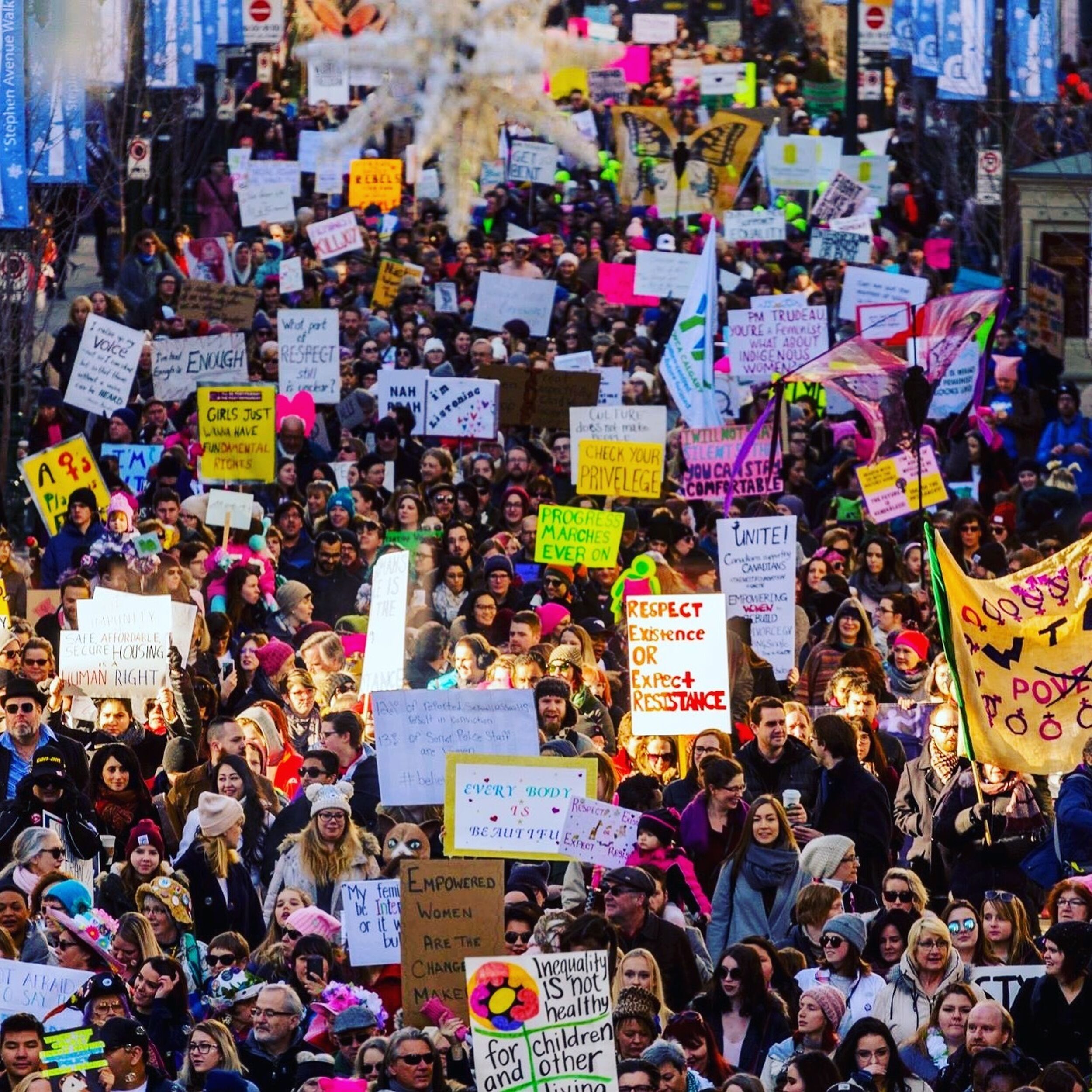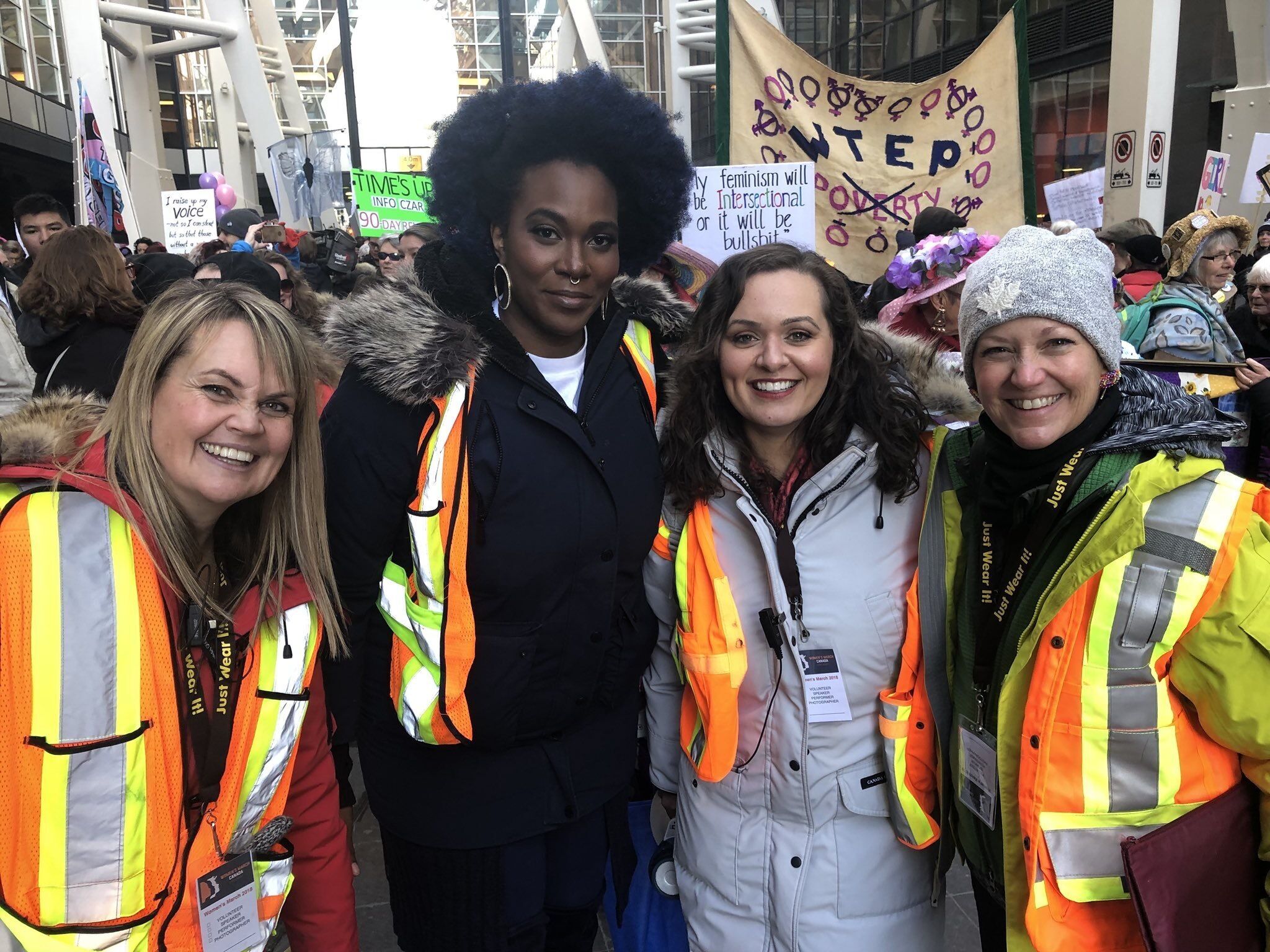
The Women's March in Calgary, January 20, 2018. Photo: Jon Yee
Support independent Calgary journalism!
Sign Me Up!The Sprawl connects Calgarians with their city through in-depth, curiosity-driven journalism. But we can't do it alone. If you value our work, support The Sprawl so we can keep digging into municipal issues in Calgary!
On January 20, 2018, I co-led the Calgary edition of the international Women’s March. The night before, I experienced all the anxieties any organizer has before an event: Will anyone show up, do people really care, was the success of the first event a fluke?
But it turned out my anxieties were baseless. The day of the protest, thousands of people showed up on a winter day, bundled up in parkas, stomping in place to keep their feet warm as they waited to march.
I remember watching as the crowd began to grow outside Bankers Hall. A friend of mine—whom I didn’t know would be attending—had brought his young daughter. There were lots of parents in the crowd of more than 3,000, their kids holding onto the signs with little mitten-encased hands. Older people were there too, people who had lived through so much social change but still felt obligated to show up. There were gaggles of teenage girls, their signs hipper and edgier than anyone else’s. The crowd, I realized, was diverse. But they were all united on a cold Saturday afternoon, ready to make their voices heard.
The Women’s March wasn’t my first ever protest, and it wasn’t the first one I’d organized. That one happened in my tweens.
But I didn’t understand that it was a protest at the time.

The crowd, I realized, was diverse. But they were all united on a cold Saturday afternoon, ready to make their voices heard.
I went to an all-girls school in a theocratic country in the Middle East. At the start of the day, after all of us were brought to school by our dads or drivers (women couldn’t drive), the school guard would chain the entrance gate door from the outside, trapping us inside. We all knew it was to “preserve our virtue.” Girls weren’t trusted to keep themselves pure. That’s why we had two women—muraqabahs—serve as our modesty police.
In Grade Six, when I was 11, they took permanent markers to our biology textbooks to censor the chapter on reproduction. They guarded the content of our small library, took us to the vice principal’s office if they caught us wearing nail polish, and forbade us from bringing anything but our textbooks and notebooks to school. We had no lockers or private areas in which to store our belongings, and sometimes we’d walk into class to see they had gone through our backpacks, searching for evidence of our moral deviance.
But we were tweens at the turn of the millennium. Satellite TV was something our parents had access to, and we watched Britney Spears and Destiny’s Child on European MTV. We practiced their dance moves with girls in older grades when we were sure no one was watching. And, even at 11 years old, we stewed in rage at being policed so closely. Eventually, our control snapped. A group of us decided to run a contraband ring of teenage magazines and music.
We splurged on J-14 and Seventeen magazines on trips abroad, bought CDs and recorded cassette tapes full of Casey’s Weekly Top 40, which played on the FM radio channel meant for the American military. We knew the muraqabahs searched our backpacks so we hid our stash in a broken AC unit and atop ceiling panels. We’d bring them out at lunch, shielding them from open view under the long skirts of our uniform.
When we were caught, the punishment was a screaming lecture from the vice principal in the presence of the entire school. Our inability to be pure became a spectacle for our peers. That didn’t stop us. We kept bringing the forbidden magazines and music to school and, as tween girls do, we learned the song lyrics, looked longingly at the glossy pictures of girls who seemed powerful ways we could never be, and daydreamed about the kinds of lives we were reading about. The muraqabahs watched us more closely. Some girls got their ears pulled. We were screamed at in front of the entire school again. We grew more reckless. It didn’t matter what they did, really. We felt endlessly debased.
Feeling like you have no value in society, at age 11, is soul crushing. Every day we were told in one way or another our greatest virtues were our obedience and our purity. We knew this wasn’t right. The contraband magazines and music were our way of protesting.
For us, our contraband ring was our tween way of saying we had some control.
I thought about that contraband ring on that chilly January day of the Women’s March—a world away from the hot country I grew up in.
I know why gender equality matters to me—I lived in a country where my gender, something I had no control over, meant everything about me was controlled. Where the virtue of my peers and I meant we were locked up every day with no fire escape. A world where my friends’ older sisters had nowhere to run when being abused by the men in their lives. I moved to Canada when I was 13 and, though it’s so much better, in so, so many ways, women, particularly women with intersecting identities, face the indignities and injustices of misogyny even in Canada.
So, yes, I knew why I marched.
But I wanted to know why others marched. I asked a woman beside me. Her niece had been raped at a young age and took her own life. I walked further and asked another woman. She had been sexually assaulted and when she went to the police, they used her Indigeneity as a reason for why it must not have happened. Later, I saw my friend, the father with his young daughter. He told me he wanted his daughter to grow up in a world where she didn’t have to grow up learning to carry her keys between her fingers while walking at night.
Everyone had a story. I got to hear some, but not enough.
Last year, hundreds of thousands of people around the world marched during a global pandemic, their masks on, to shout that Black Lives Matter. Like so many, I was glued to the coverage. I watched clips of the news where commentators would ask why people were protesting in the middle of a pandemic. I knew only someone who has never experienced injustice or been moved by human stories of injustice could ask that.
Sometimes, I think there’s a caricature of people at these kinds of protests. They’re often thought of as young, melodramatic, over-caffeinated lefties, to borrow an Alberta politico’s term. Just vote, some think. Write your MLA or MP or Prime Minister, some say.
I know this much. Since my mid-twenties, I’ve been involved in organized politics at all orders of government. I volunteer. I donate. I even ran for political office. And while sometimes I feel like the needle is moving in the right direction, sometimes it’s stuck or worse, moving backwards.
It’s easy to ask people to confine their political activities to the ballot box or political coffee parties. After all, for so many, that system has worked just fine. But for so many more, it hasn’t. And with every ballot cast or not cast, the wounds of the injustice they experience grow deeper. Voting might seem pointless, politics a dirty game with political actors whose courage can fall prey to their pursuit of power.
It’s easy to ask people to confine their political activities to the ballot box or political coffee parties.
At some point during the Women's March, I was standing by the entrance to City Hall. I got to see the faces of the thousands of people who had come out. There was emotion. Tears, but also laughter. Sadness and rage, but also hope. The hope that the politicians in power might hear their voice, see their pain and understand that change needs to happen. That we can’t go on like this.
When I think back to myself as a middle school student, I remember how powerless I felt. How we were perpetually on the brink of tragedy. I remember going to school one morning and seeing one of my best friends surrounded by a few of our other friends. She was crying. Her parents had found out her sister—the one who would teach us dance moves from Britney Spears’s Baby One More Time video—had a boyfriend, and so she had run away. My friend was terrified for her sister. Not because she had run away and couldn’t be found, but because we thought if her dad decided to kill her sister, his own daughter, no one would do anything. There would be no justice for her. We were so young, and we already understood that to some our lives were worthless.
For us, our contraband ring was our tween way of saying we had some control. We mattered beyond whatever purity measure our school thrust upon us. Our older sisters mattered, even if they disappeared and there was no justice. For the people whose stories I heard at the Women’s March, the March was their way of being seen, of having their stories and the stories of the women in their lives matter, too. For the Black Lives Matter protests, it was the radical declaration that Black lives must matter.
We all protest for different reasons and in different ways. But at the end of the day, what unites each of us is a desire for our voices to be heard so we build a city, a province, a country where we matter.
Esmahan Razavi is an associate principal at Champion Communications & PR. She co-led the Calgary Women’s March in 2018 and 2019.
Support independent Calgary journalism!
Sign Me Up!The Sprawl connects Calgarians with their city through in-depth, curiosity-driven journalism. But we can't do it alone. If you value our work, support The Sprawl so we can keep digging into municipal issues in Calgary!




